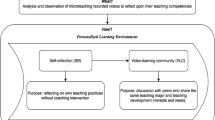Abstract
The current study investigates the role of iPad-mediated recordings as culturally enacted artifacts in generating affordances for constructive feedback on pre-service teachers teaching practice, self-reflection, and evaluation and enacting a path to guide pre-service teachers in becoming part of the epistemology of the teaching practice. A group of Swedish pre-service teachers embarked on a teaching practice placement in Tanzanian elementary schools where they documented their teaching practicum experience using iPad minis. Pre-service teachers then selected specific parts of the videos and uploaded the content on the university’s Moodle VLE site. The recorded sessions formed the primary mechanisms through which an experienced instructor offered pre-service teachers constructive feedback. Specific guidelines and training on the four indicated lesson elements that pre-service teachers needed to upload were provided prior to this practical teaching experience. Results indicate that the feedback strategies focused primarily on pre-service teachers’ planning and actual teaching practice.

Similar content being viewed by others
References
Allen, C., & Hadjistassou, S. K. (in press). Transforming pre-service teachers’ experiences through i-Pads. ELT Journal.
Ali, H., & Al-Adawi, H. (2013). Providing effective feedback to EFL teachers. Higher Education Studies, 3(3), 21–35.
Archinstein, B., & Athanases, S. Z. (2005). Focusing new teachers on diversity and equity: Toward a knowledge base for mentors. Teaching and Teacher Education: An International Journal of Research and Studies, 21(7), 843–862.
Baran, E. (2014). A review of research on mobile learning in teacher education. Journal of Educational Technology, 17(4), 17–32.
Burant, T. J., & Kirby, D. (2002). Beyond classroom-based early field experiences: Understanding an “educative practicum” in an urban school and community. Teaching and Teacher Education, 18, 561–575.
Clark, C. M., & Peterson, P. L. (1986). Teachers’ thought processes. In M. C. Wittrock (Ed.), Handbook of research on teaching (3rd ed., pp. 255–296). New York: Macmillan.
Cochran-Smith, M., & Villegas, M. (2016). Research on teacher preparation: Charting the landscape of a sprawling field. In D. Gitomer & C. Bell (Eds.), Handbook of Research on Teaching (5th ed., pp. 439–538). Washington, DC: American Educational Research Association.
Guillén, L., Gimenes, C., & Zeichner, K. (2016). Teacher education for educational and social transformation. In J. Loughran & M. L. Hamilton (Eds.), International handbook of teacher education (Vol. 2, pp. 239–272). Singapore: Springer.
Hadjistassou, S. K. (2012). An activity theory exegesis on conflict and contradictions in networked discussions and feedback exchanges. CALICO Journal, 29(2), 367–388.
Hudson, P. (2014). Feedback consistencies and inconsistencies: Eight mentors’ observations on one preservice teacher’s lesson. European Journal of Teacher Education, 37(1), 63–73.
Hudson, P., & Hudson, S. (2014). Mentor feedback: Models, viewpoints and strategies. Paper presented at the Australian Teacher Educators Association (ATEA) Conference, Sydney, Australia.
Johnson, K. E. (1992). Learning to teach: Instructional actions and decisions of preservice ESL teachers. TESOL Quarterly, 26(3), 507–535.
Lave, J., & Wegner, E. (1991). Situated learning: Legitimate peripheral participation. Cambridge: Cambridge University Press.
Maloney, J., & Powell, A. (1998). Evaluating the role of written classroom observation reports received by PGCE secondary students on school experience. British Educational Research Association Annual Conference, Belfast, Northern Ireland.
Medina, A., Hathaway, J., & Pilonieta, P. (2015). How preservice teachers’ study abroad experiences lead to changes in their perceptions of english language learners. The Interdisciplinary Journal of Study Abroad, 25, 73–91.
Metcalf, D., & Hamilton, A. (2016). Technologies and applications of context-aware mobile learning. In J. Traxler & A. Kukulska-Hulme (Eds.), Mobile learning: The next generation (pp. 11–20). New York: Routledge.
Moore, R. (2003). Reexamining the field experiences of preservice teachers. Journal of Teacher Education, 54(1), 31–42.
Peterson, R., & Treagust, D. (1995). Developing preservice teachers’ pedagogical reasoning ability. Research in Science Education, 25(3), 291–305.
Rubel, R. C. (2006). The epistemology of war gaming. Naval War College, 59(2), 108–128.
Santoro, N. (2009). Teaching in culturally diverse contexts: What knowledge about ‘self’ and ‘others’ do teachers need? Journal of Education for Teaching, 35(3), 33–45.
Schulze, M., & Smith, B. (2015). In theory—we could be better. CALICO Journal, 32(1), i–vi.
Sempowicz, T., & Hudson, P. (2011). How can a mentor’s personal attributes and pedagogical knowledge develop a preservice teacher’s behaviour management? International Journal of Learning, 18(1), 303–314.
Shaffer, D., Squire, K., Halverson, R., & Gee, J. (2005). Video games and the future of learning. Phi Delta Kappan, 87(2), 104–111.
Traxler, J., & Kukulska-Hulme, A. (2016). Introduction to the next generation of mobile learning. In J. Traxler & A. Kukulska-Hulme (Eds.), Mobile learning: The next generation (pp. 1–10). New York: Routledge.
Valli, L., & Rennert-Ariev, P. (2002). New standards and assessments? Curriculum transformation in teacher education. Journal of Curriculum Studies, 34(2), 201–225.
Zeichner, K. (2010). Rethinking the connections between campus courses and field experiences in college- and university-based teacher education. Journal of Teacher Education, 61(1–2), 89–99.
Zeichner, K. (2016). Independent teacher education programs: Apocalyptical claims, illusory evidence. Boulder: National Education Policy Center, School of Education, University of Colorado Boulder.
Author information
Authors and Affiliations
Corresponding author
Rights and permissions
About this article
Cite this article
Hadjistassou, S.K., Allen, C. Using iPad-mediated recordings to offer contingent feedback and introduce pre-service teachers to the epistemology of the teaching practice. J. Comput. Educ. 5, 373–392 (2018). https://doi.org/10.1007/s40692-018-0110-4
Received:
Revised:
Accepted:
Published:
Issue Date:
DOI: https://doi.org/10.1007/s40692-018-0110-4




